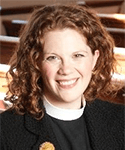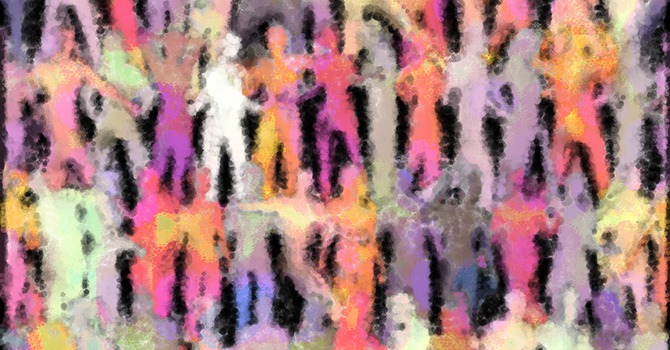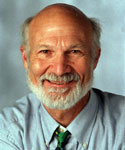Editor’s note: Faith & Leadership offers sermons that shed light on issues of Christian leadership. This sermon was preached at the Reading for Preaching conference Feb. 12, 2015, at First Congregational Church in Marlborough, Massachusetts.
I grew up making crisp-newsprint folded hats and breathing in the smell of hot wax warming for pasting up newspaper pages, because I am the daughter of a newspaper editor and a graphic designer.
Thirty years after those “take your daughter to work” visits to the newsroom, the Investigative Reporters & Editors newsletter still passes across my Twitter feed.
In the IRE’s most recent journal, Pulitzer Prize-winning reporter Bill Dedman, a senior writer at Newsday, gave this advice:
There are no stories in newsrooms. There are no stories in morning meetings and conference calls where editors throw around topics. As a reporter, resist being sent out to pursue story ideas that are really just topics. And if you’re ever an editor, send reporters out into the world, trusting them to find stories.
Even if your assignment is a high school graduation ceremony, or a routine trial, find the most interesting person to sit with. Look for documents that are not handed out at the meetings. Aggressively ask readers for story ideas. Get your business card into the hands of every person on your beat. Find ways to broaden your media diet.
Change your perspective.
Never sit in the press box.
Let us pray. Holy and gracious God, I am bold to stand before your good preachers and proclaim your holy word. So send your Spirit among us, that we might hear the word we need for our lives this day. I claim you again, my rock and my redeemer. Amen.
“Even if your assignment is a high school graduation ceremony, or a routine trial, find the most interesting person to sit with,” wrote the veteran investigative reporter. “Find the most interesting person to sit with.”
And so the Holy Spirit did.
First, the Spirit sends Philip out from Jerusalem, and then the Spirit prods Philip to go out on that strange “wilderness road” and find the most interesting person to sit with.
You know this Philip, a second-generation leader of the young church. A second-round draft pick -- really a strategic choice, a position player for the Gentiles. (Not to be confused with first-round Philip the apostle -- just Philip the deacon here.)
Philip, sent out into the world by the Spirit, away from the central activity of the church in Jerusalem. Philip, sent out without knowing what he was looking for or what purpose it would serve. St. Philip, perhaps the patron saint of reading preachers.
Before I met the saints of the church, I met the saints in the Denville Public Library.
Before my church smelled of incense and oil, communion bread and beeswax, my church smelled of old books and humans: the earthy mud tracked in after the spring rain that left stains in the carpet, the sour smell of sweaty children coming in after soccer practice, layered over the exponentially human scents of the old and the lonely who hadn’t bathed in days, all mixed with the overapplication of cologne on teenagers -- girls doused in powdery Love’s Baby Soft and boys soaked in the aggressive Drakkar Noir, which you could buy in a 36-ounce bottle for $7.99 at CVS in 1997.
All of that humanness mixed with the musty, familiar scent of old paper, a mildewed reminder that some of these books were here before you were even born, and they’d be here after you. This was my church, and these were my people.
In this church, and among these people, I traveled. We re-shelved books ordered by the Dewey Decimal system, and whole worlds opened up beyond our suburban New Jersey town: 823.912 led you to James Joyce and the Dubliners. The complete poems of Emily Dickinson were not far away at 811.4. Tucked away at 226, you could find the book of Acts and begin to examine why on earth a Hellenistic Gentile deacon was hitchhiking and picked up by a royal Ethiopian eunuch.
All the action seems to be back in Jerusalem, but our cub reporter Philip is sent out by the Spirit on the wilderness road to find a story. Not to bring a story, but to find a story. An unlikely place to find something interesting when all the breaking news is happening in Jerusalem.
But there, traveling in the same direction as Philip, goes the Ethiopian eunuch. These men are so different; they come from different races and different ethnic groups. One a wandering faith healer of an upstart religious movement, the other a royal court official and a sexual minority excluded from temple worship in Jerusalem. And yet God sends Philip to seek out the strange stranger. (Because our God is nothing if not consistent.)
The Spirit interrupts again in verse 29 and says, “Go over to this chariot and join it.” Go find the most interesting person to sit with.
So Philip runs up alongside the chariot and overhears the Ethiopian eunuch reading aloud. Reading! Arms waving, out of breath from running to catch up to a moving cart, Philip flags down the coach and asks, “Do you understand what you are reading?” The Ethiopian pokes his head out and responds, “How can I, unless someone guides me?” And with that, he invites Philip to get in and sit beside him.
The good news of this text might be in the geography -- grace in the form of divinely initiated seating arrangements.
At its best, great reading is the chance to sit alongside interesting people and listen in as they read aloud. I’m less interested in the particular text Philip and the Ethiopian are reading -- a topic for another sermon, for sure -- and more interested that they are reading together. Strangers sitting side by side, eyes fixed on the same text in their hands, moving together in the same direction.
To fully preach the gospel, we need one another and we need the stranger. Enough of these lone-ranger pastors, solitary geniuses, solo voices crying out in the wilderness! Enough of the tormented artist all on his own! How can we understand this wild and strange world, unless someone guides us? To fully preach the gospel, we need others to shout “Amen” when we’re on course and “Make it plain” when we stray from the path.
To fully preach the gospel, we need to sit side by side with people wildly different from us.
We sit side by side in the covered wagon as Pa and Ma Ingalls crisscross the prairie. We find a spot on the log raft with Huck Finn on the Mississippi River. We get crammed into the back of a psychedelic school bus named “Further” with Ken Kesey’s Merry Pranksters and share a twin bed in an 8-by-8-foot room on a bloated cruise ship with David Foster Wallace.
We take the bus through Paterson, New Jersey, in “The Brief Wondrous Life of Oscar Wao” and walk the campus of Wellington College with Zadie Smith. We follow Ayesha on foot to Mecca in Salman Rushdie’s “Satanic Verses,” and we take one step at a time along the Pacific Crest Trail with Cheryl Strayed in “Wild.” We perch on a kitchen stool next to Julia Child poring over a recipe for beef bourguignon and wonder how on earth we are going to take these words and turn them into something edible.
We sit side by side to examine these Scriptures and offer our people sustaining good news. To fully preach the gospel, we sit side by side. Because it is only in sitting side by side that we can see how God is at work in the lives of others. And if we can’t see God at work in the lives of others, how on earth can we proclaim good news?
We read because, in the words of Dr. Cornelius Plantinga in his book “Reading for Preaching,” “The reading preacher will discover that great writers know the road to the human heart and, once at their destination, know how to move our hearts.”
Church, this is why we venture down the wilderness road, unsure of either the destination or what we are looking for.
We read to get curious about what God is up to beyond our parochial selves. New Testament scholar Mitzi Smith notes that in Acts, the angel of the Lord habitually releases people from bondage. The angel’s prodding of Philip to sit and read with this stranger releases Philip from his parochial ideas of where God is at work. And then the Spirit frees the Ethiopian eunuch of his literal reading of the text before him. We read to be freed.
One of my favorite books about preaching that’s not really about preaching is “The Dead Beat: Lost Souls, Lucky Stiffs, and the Perverse Pleasures of Obituaries,” by Marilyn Johnson. As a breed of people, we preachers are like obituarists, those anonymous writers who are called to pastoral and prophetic prose with both alarming regularity and dependable surprise. They tell the stories of the famous and the near-forgotten.
Obituaries are simultaneously preserved and disposable, high literature and folk art, storytelling and meaning making. At their best, well-written obituaries are exercises in editorial discretion and prompt the reader to new reflections on a well-known subject.
According to Johnson, when hungry readers complained that the obit pages were too thin, Richard Pearson, the longtime obituary editor for the Washington Post, “would shrug and say, ‘God is my assignment editor,’ a line that now hangs over the cubicles of countless obits writers.”
For obituarist Richard Pearson, for St. Philip, and for us preachers too, God is our assignment editor. The author of our faith (Hebrews 12:2), and our great editor, might advise us:
“Even if your assignment is a high school graduation ceremony, or a routine trial, find the most interesting person to sit with. Look for documents that are not handed out at the meetings. Aggressively ask readers for story ideas. Get your business card into the hands of every person on your beat. Find ways to broaden your media diet. Change your perspective. Never sit in the press box.”
Amen.








